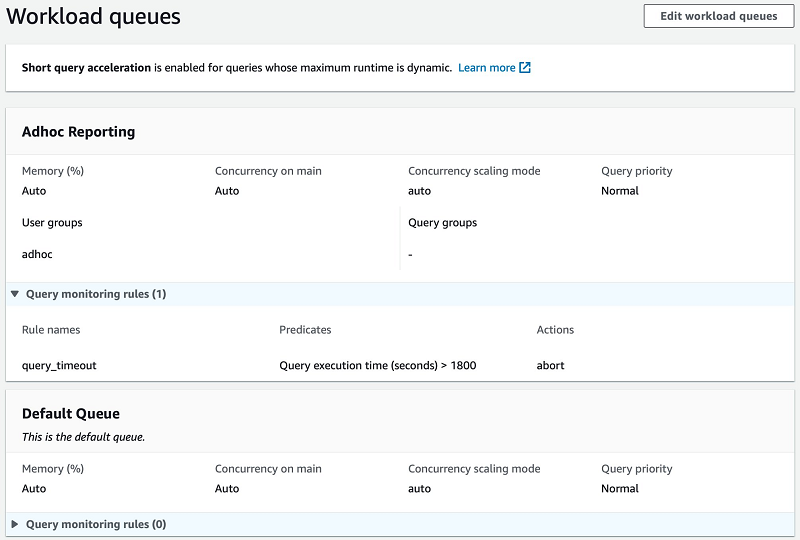AWS Big Data Blog
Category: Amazon Redshift
Extend your Amazon Redshift Data Warehouse to your Data Lake
Amazon Redshift is a fast, fully managed, cloud-native data warehouse that makes it simple and cost-effective to analyze all your data using standard SQL and your existing business intelligence tools. Many companies today are using Amazon Redshift to analyze data and perform various transformations on the data. However, as data continues to grow and become […]
Best practices for Amazon Redshift Federated Query
This post discusses 10 best practices to help you maximize the benefits of Federated Query when you have large federated data sets, when your federated queries retrieve large volumes of data, or when you have many Redshift users accessing federated data sets. These techniques are not necessary for general usage of Federated Query. They are intended for advanced users who want to make the most of this exciting feature.
Monitor and control the storage space of a schema with quotas with Amazon Redshift
Many organizations are moving toward self-service analytics, where different personas create their own insights on the evolved volume, variety, and velocity of data to keep up with the acceleration of business. This data democratization creates the need to enforce data governance, control cost, and prevent data mismanagement. Controlling the storage quota of different personas is a significant challenge for data governance and data storage operation. This post shows you how to set up Amazon Redshift storage quotas by different personas.
Migrating your Netezza data warehouse to Amazon Redshift
With IBM announcing Netezza reaching end-of-life, you’re faced with the prospect of having to migrate your data and workloads off your analytics appliance. For some, this presents an opportunity to transition to the cloud.
Enter Amazon Redshift.
Monitor and optimize queries on the new Amazon Redshift console
Tens of thousands of customers use Amazon Redshift to power their workloads to enable modern analytics use cases, such as Business Intelligence, predictive analytics, and real-time streaming analytics. As an administrator or data engineer, it’s important that your users, such as data analysts and BI professionals, get optimal performance. You can use the Amazon Redshift […]
Federate Amazon Redshift access with Microsoft Azure AD single sign-on
April 2024: This post was reviewed for accuracy. December 2022: This post was reviewed and updated for accuracy. February 2nd, 2022: This blog was updated by Kay Lerch. Recently, we helped a large enterprise customer who was building their data warehouse on Amazon Redshift, using Microsoft Azure Active Directory (Azure AD) as a corporate directory. […]
Achieve finer-grained data security with column-level access control in Amazon Redshift
September 2023: This post was reviewed for accuracy. Amazon Redshift is the most popular cloud data warehouse because it provides fast insights at a low cost. Customers can confidently run mission critical workloads, even in highly regulated industries, because Amazon Redshift comes with out of the box security and compliance. The security features, combined with […]
Speed up your ELT and BI queries with Amazon Redshift materialized views
The Amazon Redshift materialized views function helps you achieve significantly faster query performance on repeated or predictable workloads such as dashboard queries from Business Intelligence (BI) tools, such as Amazon QuickSight. It also speeds up and simplifies extract, load, and transform (ELT) data processing. You can use materialized views to store frequently used precomputations and […]
Accelerate Amazon Redshift Federated Query adoption with AWS CloudFormation
Amazon Redshift Federated Query allows you to combine the data from one or more Amazon RDS for PostgreSQL and Amazon Aurora PostgreSQL databases with data already in Amazon Redshift. You can also combine such data with data in an Amazon S3 data lake.
Build a Simplified ETL and Live Data Query Solution using Redshift Federated Query
You may have heard the saying that the best ETL is no ETL. Amazon Redshift now makes this possible with Federated Query. In its initial release, this feature lets you query data in Amazon Aurora PostgreSQL or Amazon RDS for PostgreSQL using Amazon Redshift external schemas. Federated Query also exposes the metadata from these source databases through system views and driver APIs, which allows business intelligence tools like Tableau and Amazon Quicksight to connect to Amazon Redshift and query data in PostgreSQL without having to make local copies.








